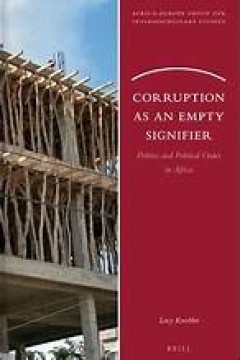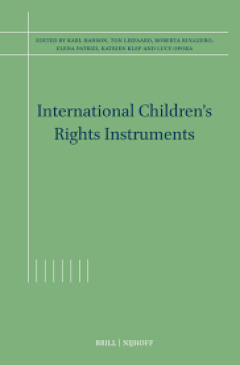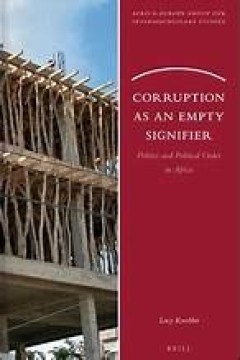Filter by

Karbala in the Taʿziyeh Episode, Shiʿi Devotional Drama in Iran
“I am not Shemr, this is not a dagger, nor is this Karbala,” recites the arch-antagonist as a taʿziyeh performance begins. Verisimilitude is not the endeavour; this is a devotional offering that stirs lament for the the Shiʿi martyrs by representing events crucial to sacred history. But what does that retelling entail? Through study of four of its main episodes—from their long inter-fem…
- Edition
- -
- ISBN/ISSN
- 978-90-04-71614-8
- Collation
- xii, 260 pp., incl. 11 fc illus.
- Series Title
- Studies on Performing Arts & Literature of the Islamicate World, Volume: 15
- Call Number
- -

Corruption as an Empty Signifier
Corruption as an Empty Signifier critically explores the ways in which corruption in Africa has been equated with African politics and political order, and offers a novel approach to understanding corruption as a potentially emancipatory discourse of political transformation.
- Edition
- -
- ISBN/ISSN
- 978-90-04-25298-1
- Collation
- oer.unej.ac.id
- Series Title
- Africa-Europe Group for Interdisciplinary Studies, Volume: 10
- Call Number
- -

International Children’s Rights Instruments
This collection is an essential supplement to the recent academic handbooks on children’s rights studies and international children's rights law. Over the years, the international legal framework on children's rights has evolved into a complex system, which includes United Nations treaties and resolutions, regional human rights instruments, such as treaties, recommendations, resolutions, and …
- Edition
- -
- ISBN/ISSN
- 978-90-04-68122-4
- Collation
- xii, 700 pp
- Series Title
- -
- Call Number
- -

Corruption as an Empty Signifier
Corruption as an Empty Signifier critically explores the ways in which corruption in Africa has been equated with African politics and political order, and offers a novel approach to understanding corruption as a potentially emancipatory discourse of political transformation. Conventionally, both academic literature as well as development policies depict corruption as the lynchpin of politics …
- Edition
- -
- ISBN/ISSN
- 978-90-04-24999-8
- Collation
- -
- Series Title
- Africa-Europe Group for Interdisciplinary Studies, Volume: 10
- Call Number
- -

Global Citizenship Education : Modern Individualism under the Test of Cosmopo…
Global citizenship education is an essential topic in an increasingly interconnected world. Indeed the need for inclusive and globally conscious education, embedded in cosmopolitanism, is recognised as a way to prepare individuals to navigate diverse cultures, address global challenges, and actively participate in a globalised world. Being both scientific and political, these challenges requ…
- Edition
- -
- ISBN/ISSN
- 978-90-04-70117-5
- Collation
- x, 222 pp
- Series Title
- Comparative and International Education: Francophonies, Volume: 1
- Call Number
- -

Young children in humanitarian and COVID-19 crises: innovations and lessons f…
The long-term consequences of COVID-19 have been tough for children around the world, but even more so for young children already in humanitarian crisis, whether due to conflict, natural disasters, or economic and political upheaval. This book investigates how organizations around the world responded to these dual challenges, identifying solutions, and learning opportunities to help to suppo…
- Edition
- 1st Edition
- ISBN/ISSN
- 9781003415213
- Collation
- -
- Series Title
- -
- Call Number
- -

The Routledge companion to global photographies
In response to widespread demand for more knowledge and insight about contemporary photographies beyond Western centers of production and dissemination, this volume provides a transnational discussion, grounded in dialogue between authors and editors from diverse locations and contexts. Ecological and decolonial discourses around photography reveal the medium’s global entanglements: images…
- Edition
- 1st Edition
- ISBN/ISSN
- 9781003368328
- Collation
- -
- Series Title
- -
- Call Number
- -

Social infrastructure and left behind places
This book explores the making, unmaking and remaking of social infrastructure in ‘left-behind places’. Such places, typically once flourishing industrial communities that have been excluded from recent economic growth, now attract academic and policy attention as sites of a political backlash against globalisation and liberal democracy. The book focuses on the role of social infrastructure …
- Edition
- -
- ISBN/ISSN
- 9781032710051
- Collation
- -
- Series Title
- -
- Call Number
- -

Governing delinquency through freedom :control, rehabilitation and desistance
- Edition
- -
- ISBN/ISSN
- -
- Collation
- -
- Series Title
- -
- Call Number
- -
- Edition
- -
- ISBN/ISSN
- -
- Collation
- -
- Series Title
- -
- Call Number
- -

The Routledge companion to global photographies
- Edition
- -
- ISBN/ISSN
- -
- Collation
- -
- Series Title
- -
- Call Number
- -
- Edition
- -
- ISBN/ISSN
- -
- Collation
- -
- Series Title
- -
- Call Number
- -
 Computer Science, Information & General Works
Computer Science, Information & General Works  Philosophy & Psychology
Philosophy & Psychology  Religion
Religion  Social Sciences
Social Sciences  Language
Language  Pure Science
Pure Science  Applied Sciences
Applied Sciences  Art & Recreation
Art & Recreation  Literature
Literature  History & Geography
History & Geography